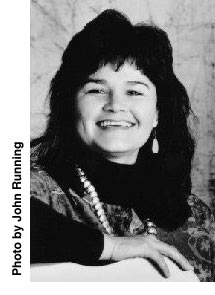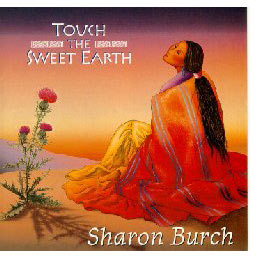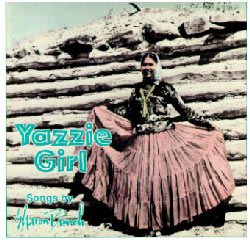Sharon Burch: The Blessing Way

Sharon Burch, Navaho folk singer and songwriter, is the daughter of a
German father and a Navaho mother; for her, growing up bi-cultural was a
blessing.
"My grandfather was a Navaho healer who followed the Blessing
Way. He had a very positive approach to life," Burch said, speaking
from her Northern California home. "He brought my mother up to respect
Indians and non-Indians, and taught us not to be afraid of what happens
in this life, because in the final account, everything turns back to
beauty."
In her music and her life, Burch has kept to the Blessing Way, finding
a way to balance Navaho traditions with the demands of the modern
non-Indian world. "People think I'm primarily a musician, but my main
priority is my family. I work with developmentally disabled people -
children and adults - who have special needs. That's really what I do,
although right now I'm on maternity leave with my second child.
"People tell me 'The music is wonderful, why don't you do it full
time?' It's to maintain balance in my life. I don't want the music to
be work, I want it to be a gift. When I'm asked to do a show, I do it,
but don't look for venues. I don't have a career plan."
 Burch has recorded three albums for Canyon Records, including Touch
the Sweet Earth, winner of the 1996 Indie Grammy for Best Native
American Recording, and while her music pays respect to her traditional
Navaho childhood, it also reflects her bi-cultural outlook, combining
Navaho words and melodies with western guitar styles.
Burch has recorded three albums for Canyon Records, including Touch
the Sweet Earth, winner of the 1996 Indie Grammy for Best Native
American Recording, and while her music pays respect to her traditional
Navaho childhood, it also reflects her bi-cultural outlook, combining
Navaho words and melodies with western guitar styles.
"I grew up traveling with my mom and granddad to the ceremonies my
grandfather conducted. They tell me I joined in the singing as a child,
and although I don't remember that, I do remember the sound of the
music, bouncing off of the walls of the hogans and surrounding me."
In college Burch began singing at folk festivals, although she said she
had terrible bouts with stage fright. In 1980 she met A. Paul Ortega,
who said he wanted to make a record with her. "I idolized him," Burch
said, "but I told him 'You've never heard me sing.' He said 'I know
these things.' I found out later he's an Apache medicine man, so we
started working on an album, which took about four years to do."
Burch worked on The Blessing Ways between gigs with Ortega's band.
She sang backup and eventually got a solo spot. At that point, she
decided she wanted to create her own songs, based on the teachings of
her grandfather.
 "I asked my grandfather if I could use these songs, or my
interpretations of them. He said I could." Yazzie Girl Burch's first
solo album, included traditional chants set to music by Burch as well as
her own compositions. Her honey soaked alto and spare guitar
accompaniment made the album a treat for both Navaho and non-Indian
ears. "I sing in Navaho to pay respect to my family, the earth and the
language I was raised in. I didn't speak English till I was in
Kindergarten and I still have aunts that don't speak any English, and
those women are very important to me.
"I asked my grandfather if I could use these songs, or my
interpretations of them. He said I could." Yazzie Girl Burch's first
solo album, included traditional chants set to music by Burch as well as
her own compositions. Her honey soaked alto and spare guitar
accompaniment made the album a treat for both Navaho and non-Indian
ears. "I sing in Navaho to pay respect to my family, the earth and the
language I was raised in. I didn't speak English till I was in
Kindergarten and I still have aunts that don't speak any English, and
those women are very important to me.
"The songs help me keep balance. When I'm angry or the tension builds
up, I put on the albums and remember my grandfather's words. It's o.k.
to experience the negative, as long as it's in balance.
"I sometimes think about people who want to protect their children from
the world. They send kids to restricted schools, and so it's unfair to
the child. They should be exposed to everything, because the whole
world is ours and I want my children to experience it all. Having a
German father and Native mother helped me understand that a human can
relate to all people, not just your own kind. The whole planet is ours;
there should be no boundaries."
Visit our iTunes shop for Native American music downloads.
j. poet is the music editor for Indian Artists magazine. He also writes
about world music, blues, jazz, folk and pop culture for a variety of
national, international and online publications. Feedback, offers of new
product or queries? <[email protected]>
Sharon Burch
on the Canyon Records Productions site.
Return to the Index of artist profiles
 Burch has recorded three albums for Canyon Records, including Touch
the Sweet Earth, winner of the 1996 Indie Grammy for Best Native
American Recording, and while her music pays respect to her traditional
Navaho childhood, it also reflects her bi-cultural outlook, combining
Navaho words and melodies with western guitar styles.
Burch has recorded three albums for Canyon Records, including Touch
the Sweet Earth, winner of the 1996 Indie Grammy for Best Native
American Recording, and while her music pays respect to her traditional
Navaho childhood, it also reflects her bi-cultural outlook, combining
Navaho words and melodies with western guitar styles.

 "I asked my grandfather if I could use these songs, or my
interpretations of them. He said I could." Yazzie Girl Burch's first
solo album, included traditional chants set to music by Burch as well as
her own compositions. Her honey soaked alto and spare guitar
accompaniment made the album a treat for both Navaho and non-Indian
ears. "I sing in Navaho to pay respect to my family, the earth and the
language I was raised in. I didn't speak English till I was in
Kindergarten and I still have aunts that don't speak any English, and
those women are very important to me.
"I asked my grandfather if I could use these songs, or my
interpretations of them. He said I could." Yazzie Girl Burch's first
solo album, included traditional chants set to music by Burch as well as
her own compositions. Her honey soaked alto and spare guitar
accompaniment made the album a treat for both Navaho and non-Indian
ears. "I sing in Navaho to pay respect to my family, the earth and the
language I was raised in. I didn't speak English till I was in
Kindergarten and I still have aunts that don't speak any English, and
those women are very important to me.